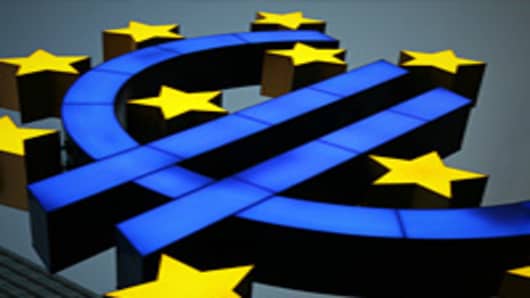The European Central Bank will leave rates on hold on Thursday and continue to assess the impact on the economy of two rounds of cheap, 3-year funding for banks, analysts told CNBC, warning that the bank’s ability to fight the crisis is waning.
The funding operations, launched in December and at the end of February, were welcomed by many analysts, who argued that they stabilized Europe’s banking system and prevented a credit crunch.
They enabled banks in troubled periphery countries to access funds.
“Recent economic data is mixed, but not so weak that it will trigger a rate cut, in our view. The ECB remains in ‘wait and see’ mode as it assesses the impact of the two 3-year LTROs [long-term refinancing operations],” according to analysts at Danske Bank.
Inflation also remains stubbornly high as a result of rising energy prices, further reducing the likelohood of a rate cut.
Instead, financial markets will scour comments by ECB President Mario Draghi at a press conference for hints of fresh stimulus to boost growth.
While improving economic indicators raised hopes at the start of the year that the euro zone was emerging from the crisis, more recent economic data has shown that eight euro zone countries are now in recession, while others are struggling to grow.
That has led to more and more politicians—faced with angry voters rebelling against spending cuts—and policymakers to call for a focus on growth rather than only on harsh austerity measures, which they argue are having detrimental effects.
Figures released on Wednesday showed that the unemployment rate in the euro zone rose to 10.9 percent in March, a joint record high since 1995.
Elections in France and Greece this weekend look likely to replace incumbents who introduced harsh austerity with leaders focused on growth.
The ECB’s Draghi has even argued in favor of a “growth compact” to complement the “fiscal compact” signed by most European Union countries in March. That agreement is aimed at keeping budget deficits under control, but critics argue that turning to fiscal austerity in a downturn only makes matters worse.
“While it seems like a simple matter to reduce the debt to GDP ratio by making the numerator of that fraction smaller, the downside is that reducing that numerator also lowers GDP, the denominator,” said Carl Weinberg, chief economist at High Frequency Economics.
“That simple arithmetic fact makes progress toward a sustainable debt ratio slower and more expensive in terms of lost prosperity,” he said.
Danske Bank pointed out that the renewed focus on growth has sparked speculation as to whether that could be an early signal of a June rate cut by the ECB. But the bank doesn’t go that far.
“We do not share this interpretation,” Danske Bank analysts said. “In our view, Draghi’s new outspoken focus on growth is a hint to the euro area political leaders that the ECB will support public investments in infrastructure projects. In the last couple of days it has been suggested that these projects could be funded via the EIB [European Investment Bank],” they said.
Clues on Stimulus
A sharp rise in peripheral bond yields in recent weeks—in particular for Spanish government debt after S&P downgraded the countryfor the second time this year—has left many bond market investors wondering whether the ECB will step in to calm markets.
“In our view, the ECB will not hesitate to intervene again should market tensions increase further. However, not all ECB tools are as sharp as they used to be,” Carsten Brzeski, senior economist at ING said.
“Take, for example, the SMP program [the ECB’s bond-buying program]. Since the Greek haircut, markets sense a two-tiered market when the ECB steps in, probably requiring the ECB to increase its efforts to achieve similar effects as in the past,” he said.
He believes new LTROs “could be the most (and only) effective tool, even if new conflicts within the ECB are created.” Danske Bank analysts believe, however, that the second LTRO was the end of the easing cycle.
German Chancellor Angela Merkel has maintained her opposition to more stimulus to boost the economy, and the measure has already created tension among ECB board members.
But German media have recently cited her as saying that Germany is, however, prepared to increase the European Investment Bank's resources to strengthen sustainable growth.
“The symbolism could hardly be greater. For those who suggest that the euro is about to fall apart this is a reminder from the leaders of the euro area of what the euro project is all about: bridging the euro area economies and building bridges between the people of Europe. Remember—the euro bill even carries a bridge,” Danske analysts said.
Brzeski at ING said that while, throughout the crisis, the ECB has acted as the euro zone’s fire brigade, even the fire brigade can reach its limits.
“It currently looks as if the ECB will have to use bigger and bigger instruments to still make a difference,” said.
“This is an uncomfortable situation for the ECB, and a reason why ECB president Draghi may try to put the ball back into the court of the euro zone politicians,” he added. “Draghi’s support of a growth compact is no escape from the fiscal compact—we see it as only a hidden distress call.”



